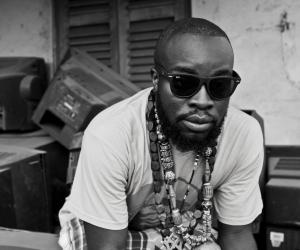From the Series
Another new year has rolled round, bringing with it a wave of anticipation for the scintillating things that we can all look forward to musically in 2015. Thus far African music has enjoyed a reinterpretation of its place in the world, and with that comes more and more engaging contemporary African sounds from all over the continent that are impossible to replicate.
The big news on Design Indaba’s front is that Ghanaian wordsmith and musician M.anifest will perform at The Side Show on Thursday 26 February as part of Design Indaba Music 2015, a showcase of African talent at the annual Design Indaba Festival. The Side Show lineup, which will include five other acts, will be joined by three evenings of music at Design Indabar from 25 to 27 February.
Shiba Mazaza sat down to have a chat with the internationally acclaimed rapper to discuss what the future holds for him, African music from an outsider’s perspective and the importance of legacy within his craft.
It’s 2015, we’ve got a new year going... how are you feeling?
I am well. A new year has begun, and I’m in studio working on lots of music!
Great! We see on Facebook you’ve been asking for future collaborations… did you find anything worth noting?
At the beginning of the year I fancied taking advice from the general public out of pure curiosity to see who people think I could have an interesting collaboration with. There’s always one or two interesting names that come up... It makes me say, “Why haven’t I researched them yet?”
You’re based in Ghana now for the most part, yes? What brought you to that decision?
For the past three years I have been [in Ghana]. It was never the plan to leave Ghana for good in the first place… it was always my intention to return to the original plan. Sometimes it’s important to open your mind to the things that can happen. I don’t think I would be the person I am if I didn’t take that detour. I think coming back home solidified me, put me back in my sound, so now when I go and come back I definitely don’t lose my centre.
All the travelling and the big names you’ve worked with have created quite an impact in the music world. Did you always know you wanted to be a musician, and did you ever think your music would reach this level of success?
I didn’t always know… I always knew my passion and love for music would be something to pursue. I would be a downright liar if I said I knew from an early age that I wanted to do music. I don’t take anything for granted… there are a lot of surprises but I don’t get carried away.
Legacy is a big part of what I do. I’m carrying the legacies of so many people before me and I hope to do that for all the people that will come after me… In a strange way having my grandfather [Prof. J.H. Nketia] being so prominent in the world as an ethnomusicologist happened separately from my path; I think people had already caught on before they realised there was a link. Those are large shoes to fill, and it’s only been beneficial to me to have a great resource like him.
As an entrepreneur and a creative, when it comes to making music and money at the same time, do you ever feel like you have to “sell out” when you create? Music is a shared experience, and listeners will take on their own ideas about what you create... it’s a big thing to try to reconcile in your head. How do you deal with all of that?
As a musician you should aim to sell out your shows, not your craft. You learn the ways to succeed and you have to learn how to give yourself more legroom… If you have to compromise yourself to the level at which you are unhappy, to the point where you have bastardised completely what your mission is, I don’t think [that is a good idea]... It’s about being wise about yourself and it takes a lot of work. We don’t have as much infrastructure in Ghana but we have a lot of credible artists. You just have to be entrepreneurial about creating yourself and think of the long game rather than just the short game.
Speaking of expectations, in all your travels what does Africa look like from out there?
I think African music is a surprising departure from the representation of the Africa that a lot of people see. African music is joyful and can be painful and can be all those things… but contemporary African music that combines the old and the new is even more intriguing now. People are intrigued and excited, and I think African artists who are serious about their craft can stand in front of an audience who don’t know their music and absolutely floor them. I think it has something to do with how our music is made...
What I will say is that we do have a quality control problem we have to work on because when you travel the world you realise that everything is going at a quality that people can feel and recognise as good. What we have here on this side of the world is great quality in innovation and an unthinkable number of ideas that come up all the time. How do we craft it well, how do we work on the finishing? It’s not about having a million dollars to shoot a video or record an album, it’s how you make these ideas happen with our innovation using our natural resourcefulness.
Having said that, there is quite a big trend around African music across the world but at some level people here in Africa don’t see themselves in that light. Do you agree?
It’s always been the case; it’s not a new problem and it’s not even an African problem. The places with the greatest amount of innovation can be complacent about the effect they will have. Sometimes it takes being removed from your environment to sense the value of what you have. And sometimes it takes someone taking commercial advantage of it in order for people to notice that value! Most of the stuff is not made with the idea of selling. It is made because of a need… those creative ideas and feelings will haunt you and you can’t shake that feeling until you’ve made it come to life.








